
Linda Zampol D'Ortia
"Young Researcher" fellow (rtd-a), Ca' Foscari University of Venice
Religion + History // Asia + Europe
News
New Research project: EMOPowers - "Emotional Practices, Power Relations, and Asymmetrical Dependencies in Catholic Missions (1549-1700)": Young Researcher fellowship (rtd-a), at Ca'Foscari University Venice (2025-2028)Activities: MEEM - Mediterranean Emotions: A Global Research Hotspot. MEEM aims to foster activities, partnerships and publications exploring the history of emotions, with scholars and institutions based on both shores of the Mediterranean as its main stakeholders.Publications: A Failing Mission? Salvation in the Jesuit Mission in Japan under Francisco Cabral (Edizioni Ca’Foscari, 2024).
"Unloving Mothers: Jesuit Knowledge Production on Abortion and Infanticide in Japan in the Sixteenth and Seventeenth Centuries" Journal of Religious History, 2025.
Projects
Ongoing EMOPowers - "Emotional Practices, Power Relations, and Asymmetrical Dependencies in Catholic Missions (1549-1700)": Young Researcher fellowship (rtd-a), at Ca'Foscari University Venice (2025-2028)
EMOPractices - "Emotions as Practice in the early modern Jesuit missions in the Asia-Pacific": Marie Skłodowska-Curie Action, at Ca'Foscari University Venice and Australian Catholic University (2021-2024). Extended with a MSCA+1 fellowship (2024-2025)
"Emotion and Conversion: Early Modern Jesuits in Asia": Vittorio Branca research fellowship, Giorgio Cini Foundation (IT)
"Religious Garments in the Jesuit Mission to Japan": KHK Visiting Research Fellow, Center for Religious Studies (CERES), Ruhr University Bochum (DE)
"Perceptions of missionary failure in Japan (1549-1639)": Harold S. Williams Fellow for Research in Japan Studies, National Library of Australia (AU)
Research Assistant in the project “Interactions between rivals. The Christian mission and Buddhist sects in Japan (c.1549-c.1647)” (FCT - PTDC/HIS-HIS/118404/2010, PI: Alexandra Curvelo), at the Centre for the Humanities (CHAM), New University of Lisbon (PT)
Research Interests
Early modern Catholic missions, with a focus on the Society of Jesus in Asia
Religion in Japan
History of emotions
Orientalisms
Gender studies
History of intercultural contacts
Medieval and early modern Christian theology
Religion and the senses
Failure in history and memory
EMOPowers

"Emotional Practices, Power Relations, and Asymmetrical Dependencies in Catholic Missions (1549-1700)"
Young Researcher fellowship (2025-present)
at Ca'Foscari University Venice (IT)The project EMOPowers aims to identify how emotional practices produced and justified new structures of power in sixteenth/seventeenth-century extra-European Catholic missions.Output Publications:
✦TBA
EMOPractices
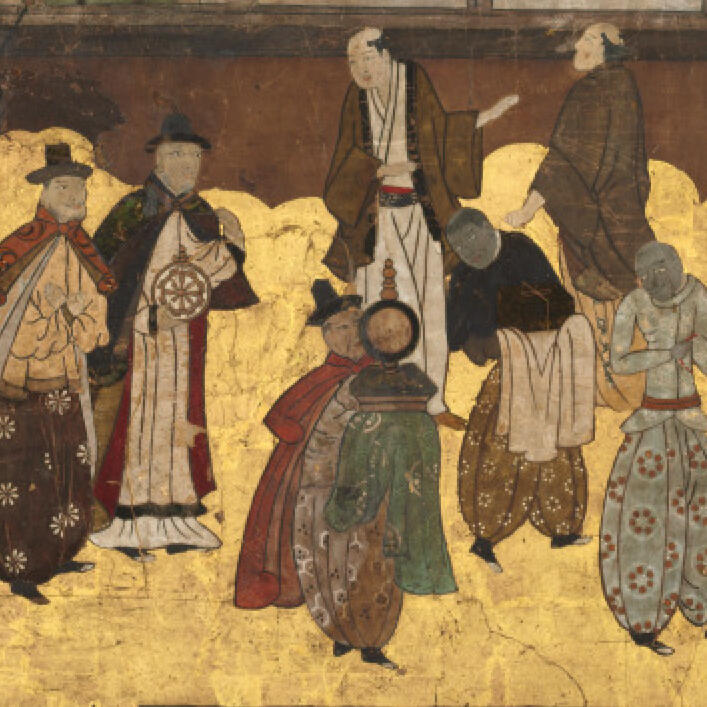
"Emotions as Practice in the early modern Jesuit missions in the Asia-Pacific"
Marie Skłodowska-Curie Action (2021-2024)
at Ca'Foscari University Venice (IT) and
Australian Catholic University (AU)This Action approaches the XVI-XVIII-century Asian enterprises of the Society of Jesus through the lens of emotions. Introducing the concept of the “emotional Other” (the emotional dimension of the construct of the Other), it reveals the previously disregarded role of Jesuit emotional practices and their impact on the creation of stereotypes of peoples of the Asia-Pacific region. This Action thus analyses the emotional typologies used by the Jesuits to classify different Asian people; it identifies the emotional practices the missionaries used to bridge cultural divides and, at the same time, establish the domination of Asian people; and it exposes the mechanisms of the discursive creation of the emotional Other, as part of the changes in early modern European understanding of the world and humankind.Output Publications:
✦“Emotional Practices as Global Salvation: Jesuit Ippolito Desideri’s Plan for the Conversion of the World in his Historical Notices of Tibet (1728)” .forthcoming.
✦"Unloving Mothers: Jesuit Knowledge Production on Abortion and Infanticide in Japan in the Sixteenth and Seventeenth Centuries"
✦ "The Good Death of Paula of Miyako (c.1552-1570). The Religious and Emotional Practices of Dying in Christian Japan"
✦ “Emotional Practices of Catholic Martyrdom in Early Modern Japan”.
Project Page @ Unive.it.
Emotion and Conversion
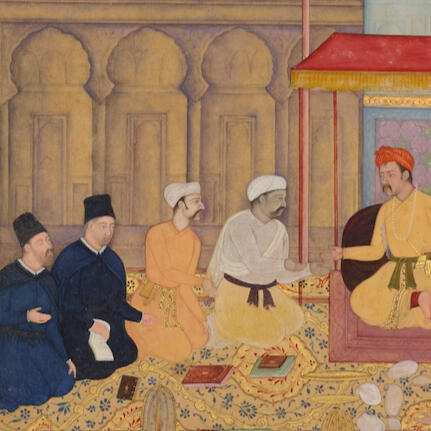
"Emotion and Conversion: Early Modern Jesuits in Asia"
Vittorio Branca research fellowship (Aug-Nov 2019)
Centre for Comparative Studies of Civilisations and Spiritualities
Giorgio Cini Foundation (Venice, IT)This project aims to identify the Catholic missionaries’ use of emotions as tools of evangelization among Asian peoples in the early modern period.
To do so, it analyses the emotional scripts present in the missionary literature written by four Italian Jesuits who carried out pioneering work in different geographical areas and had in common a willingness to promote a dialogue across cultures as basis for their work (the so-called accommodation policy).The four case studies considered are: Alessandro Valignano (1539–1606), Visitor of the Indian province of the Society of Jesus, who wrote extensively about Indian and Japanese people and was a fierce supporter of accommodation; Rodolfo Acquaviva (1550–1583), representative of the first mission to the Mughal Empire; Matteo Ricci (1552–1610), one of the founders of the mission to China, who studied its culture for nearly thirty years; and Ippolito Desideri (1684–1733), one of the first Europeans to visit Tibet and to write about Tibetan Buddhism.Output Publication:
"Representations of Tibet and Responses to Missionary Failure in Ippolito Desideri’s Italian Writings"Project's Page on the Centre for Comparative Studies' website.
Religious garments

"Religious Garments in the Jesuit Mission to Japan"
KHK Visiting Research Fellow (June-Sept 2018)
Center for Religious Studies (CERES), Ruhr University Bochum (DE)This project set out to analyse the use of dress as an indicator of the priorities and the
objectives of the missionaries in the larger question of inter-religious contact within the early modern Jesuit mission in Japan.Page on CERES's websiteOutput Publication: The Dress of Evangelization: Jesuit Garments, Liturgical Textiles, and the Senses in Early Modern Japan, Entangled Religions 10.
Missionary failure

"Perceptions of missionary failure in Japan (1549-1639)"
Harold S. Williams Fellow for Research in Japan Studies (Jan-Mar 2018)
National Library of Australia (Canberra, AU)This project set out to map and analyse the perceptions of failure in the early modern mission of the Society of Jesus in Japan, with particular focus on the failed expectations of mission superiors Francisco Cabral and Alessandro Valignano, by making extensive use of the Braga Collection at the National Library of Australia.Output Publication:
“From a Watchtower: Francisco Cabral's Envisioning of the Failure of the Jesuit Japanese Mission (1593)”
Catholic Missionaries and Buddhism
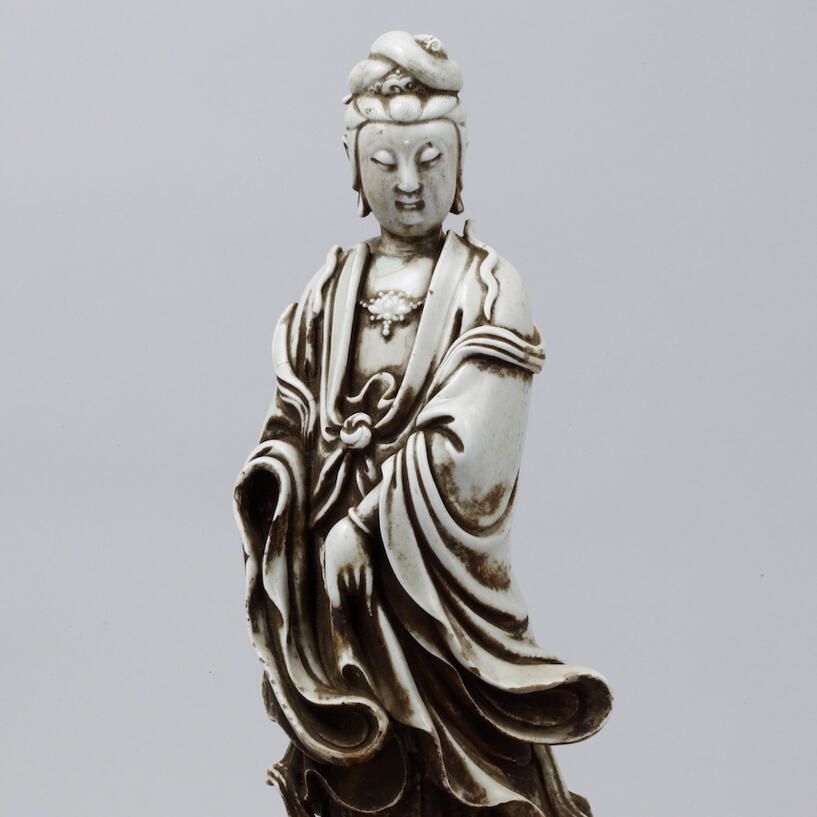
Research Assistant in the project “Interactions between Rivals. The Christian mission and Buddhist sects in Japan (c.1549-c.1647)” (FCT-PTDC/HIS-HIS/118404/2010, PI: Alexandra Curvelo) (Jan-Nov 2015)
Centre for the Humanities (CHAM), New University of Lisbon (PT)Duties: Analysis of printed primary sources written by the Jesuit missionaries in Japan, to contribute to the creation of the project's database; collaboration to the presentation of the Jesuit interpretation of Japanese Buddhism that emerges from these sources, during the project's final conference; contribute to a co-authored chapter of the project's book.Output Publication (OA):
Linda Zampol D’ORTIA, Lucia DOLCE, Ana Fernandes PINTO
"Saints, Sects, and (Holy) Sites: The Jesuit Mapping of Japanese Buddhism (Sixteenth Century)"Open Access Database
of Christian sources about interactions with Buddhism in Japan
by Ana Fernandes PINTO, Linda Zampol D'ORTIA
PUBLICATIONS
Monograph
A Failing Mission? Salvation in the Jesuit Mission in Japan under Francisco Cabral (Edizioni Ca'Foscari, 2024). Open Access monograph.
The Jesuit textual production from the sixteenth century leaves no doubt that the Japanese evangelising enterprise was publicised as the epitome of success. Francisco Cabral, third superior of the mission, who had initially shared this judgement, in time began fearing that the mission was, instead, doomed to failure. As he perceived the loosening of the internal ties of the Society of Jesus, and the salvation of the catechumens as more and more independent of that of the Jesuits, Cabral concluded that God had abandoned the mission. This study, using little-known manuscript sources, examines Cabral’s attitudes towards his confreres and the Japanese people, to illuminate how particular salvation mechanics could define early modern Catholic missions.Journal Articles/Book Chapters
"Unloving Mothers: Jesuit Knowledge Production on Abortion and Infanticide in Japan in the Sixteenth and Seventeenth Centuries" Journal of Religious History, July 2025. Open Access article.
This article analyses the reference to local practices of abortion and infanticide by the Japanese mission of the Society of Jesus between the sixteenth and the seventeenth centuries, as a case study of Jesuit knowledge production on the country. Albeit described as common, allusions to such condemned practices in Jesuit literature were scant. This article dissects them to understand how the missionaries perceived these practices, and how and why they identified different causes in the narratives they sent to Europe, of socio-economic and religious natures. It then illustrates the European-Catholic background and practical reasons why such Jesuit narratives coalesced, first, in a depiction of Japanese mothers as unable to love, and then as embodying wrong practices of love for their children."Special Issue “Gender and Emotion in Early Japanese Christianity” – Introduction" with Jessica O'Leary, Journal of Religious History, July 2025."The Good Death of Paula of Miyako (c.1552-1570). The Religious and Emotional Practices of Dying in Christian Japan" Studi Tanatologici 1-2, second series (2022-23). Open Access article.
This paper examines the practices of good death in the Catholic mission of Japan of the sixteenth/seventeenth century using as a case study the death of a young woman living in Miyako (Kyoto), Paula. In competition for proselytes with the Japanese Buddhist sects, especially the Pure Land ones, the Jesuit missionaries spent considerable effort to make the rituals that surrounded the passing of the converts as attractive and efficient as possible. This paper focuses on the religious and emotional practices that characterised Paula’s death to analyse how European traditions were adapted to the Japanese context, the influence of Buddhism on them, and how the missionaries strove to create new models of martyrs in an epoch before the start of the persecutions by the Tokugawa regime."Representations of Tibet and Responses to Missionary Failure in Ippolito Desideri’s Italian Writings" in East and West Entangled (17th-21st Centuries). Rolando Minuti, Giovanni Tarantino, eds. (Firenze University Press, 2023). Open Access book chapter.
This chapter considers the long shadow of failure on the 1716–1721 mission to Tibet by Italian Jesuit Ippolito Desideri (1684–1733). Analysing Desideri’s letters, his missionary manual, and his Notizie historiche del Thibet, it focuses on the historical actors’ perceptions of missionary failure, and on the expectations and biases these perceptions created, to expose otherwise neglected aspects of this intercultural encounter. It investigates the impact that these perceptions had on the tensions extant in the Jesuit Province of Goa, on Desideri’s description of the populations of the so-called “Three Tibets” (Baltistan, Ladakh and Tibet), and on the missionary policy he proposed for creating a Catholic Christendom that could spread globally.“Emotional Practices of Catholic Martyrdom in Early Modern Japan” in Profiling Saints. Images of Modern Sanctity in a Global World. Elisa Frei, Eleonora Rai, eds. Refo500 Academic Studies (Vandenhoeck & Ruprecht, 2022): 271–90. Pre-print in institutional depository (ARCA).
The wave of persecutions that hit the Japanese Catholic community between the end of the sixteenth century and the first half of the seventeenth century had among its consequences the production of a great number of texts by its missionaries and local clergy. Eyewitness accounts, letters written by the condemned, and summarizing reports, paint vivid images of the martyrs, providing many details about their final days. Martyrdom manuals, on the other hand, took on a more didactic tone, to illustrate to the Japanese, and remind to the missionaries, the principles of martyrdom, and to adapt them to their specific cultural and historical context. This paper analyzes examples from this vast corpus in order to identify the emotional practices that characterized the models of martyrdom of the Japanese Catholic community. Such practices were implemented to mobilize, regulate, and communicate the correct emotional attitudes, to help creating the desired spiritual predispositions. Before and during the executions, which was a key event in reasserting the values of the threatened Catholic community, the actions of all those involved came under scrutiny; emotional practices represented a map to navigate this emotionally charged situation, to avoid the loss of self-control and to reach the desired outcome of martyrdom."Saints, Sects, and (Holy) Sites: The Jesuit Mapping of Japanese Buddhism (Sixteenth Century)", co-authored with Lucia Dolce and Ana Fernandes Pinto, in Interactions Between Rivals: The Christian Mission and Buddhist Sects in Japan (c.1549-c.1647). Alexandra Curvelo and Angelo Cattaneo eds. (Peter Lang: 2021): 67–106. Open access book chapter.“From a Watchtower: Francisco Cabral's Envisioning of the Failure of the Jesuit Japanese Mission (1593)” in Narratives and Representations of Suffering, Failure and Martyrdom. Leonardo Cohen, ed. (Universidade Católica Portuguesa, Centro de Estudos de História Religiosa: 2020). Pre-print on Academia.edu."The Dress of Evangelization: Jesuit Garments, Liturgical Textiles, and the Senses in Early Modern Japan." Entangled Religions 10. (2020) Open Access journal article."Purple Silk and Black Cotton: Francisco Cabral and the Negotiation of Jesuit Attire in Japan (1570–73)" in Exploring Jesuit Distinctiveness. Interdisciplinary Perspectives on Ways of Proceeding within the Society of Jesus. Robert A. Maryks, ed. (Leiden: Brill, 2016): 137-155. Open Access book chapter."Il ruolo delle ‘università’ nella strategia missionaria di Francesco Saverio per il Giappone.” Revista Estudios 32 (2016). Open Access journal article.
PUBLICATIONS
Reviews:
Review of "Catecismo da fé cristá, no qual se mostra a verdade da nossa religião e se refutam as seitas japonesas," edited by António Guimarães Pinto and José Miguel dos Santos. Lisbon, Centro Científico de Macau, I.P., Fundação Jorge Álvares, 2017, 384 p.
Bulletin of Portuguese Japanese Studies, vol.3-4 (2017-2018). Open Access.Review of "Nuns’ Priests’ Tales: Men and Salvation in Medieval Women’s Monastic Life," by Fiona J. Griffiths. Philadelphia, University of Pennsylvania Press, 2018; cloth; pp. 424; 29 b/w illustrations; R.R.P. US$69.95, £58.00; ISBN 9780812249750.
Parergon 37, no.1 (2020). Open Access.Review of "Rewriting Holiness: Reconfiguring Vitae, Re-signifying Cults," edited by Madeleine Gray (King’s College London Medieval Studies, 25), London, King’s College London, Centre for Late Antique and Medieval Studies, 2017; hardback; pp. 338; 9 colour illustrations; R.R.P. £60.00; ISBN 9780953983896.
Parergon 37, no.1 (2020). Open Access.Review of "The Hebrew Bible in Fifteenth-Century Spain: Exegesis, Literature, Philosophy, and the Arts," edited by Jonathan Decter and Arturo Prats.
Relegere 5, no.1 (2015). Open Access.
Activities
Hybrid, bilingual Seminar Feeling Together: Esperienze collettive di appartenenza nelle società di età moderna / Collective experiences of belonging in early modern societies convened by the Italian Society for the History of the Early Modern Age (SISEM). 19-20 May 2025. Organised with Prof. Piroska Nagy, Prof. Giovanni Tarantino, Dr Claudio Passera, Dr Emanuele Giusti.MEEM - Mediterranean Emotions: A Global Research Hotspot. MEEM aims to foster activities, partnerships and publications exploring the history of emotions, with scholars and institutions based on both shores of the Mediterranean as its main stakeholders. MEEM Seminar Series "Emotional Grammars of Globalization" 2024/2025. Organised with Prof. Giovanni Tarantino and Dr Claudio Passera.Hybrid Workshop Emotions, Affects, Feelings: Asian and European Historical Encounters 10-11 September 2024, Ca' Foscari University of Venice & Online.Hybrid Workshop Intercultural Encounters between Masculinities in the Pre-modern World: Emotions and Religion 15-16 July 2024, Melbourne & online, hosted by the Gender and Women’s History Research Centre, Australian Catholic University. Convened with Prof. Susan Broomhall. Call for papers for the publication of proceedings.Workshop Gender and Emotion in Asia-Pacific Catholicisms
28 February - 1 March 2024, online. Hosted by the Initiative for the Study of Asian Catholics (ISAC), Asia Research Institute (Singapore). Convened with Dr Michel Chambon.International Workshop Gender and Emotion in Japanese Christianity (1549-1638)
7 February 2023, Melbourne & online. Hosted by the Gender and Women's History Research Centre at Australian Catholic University. Convened with Dr Jessica O'Leary.
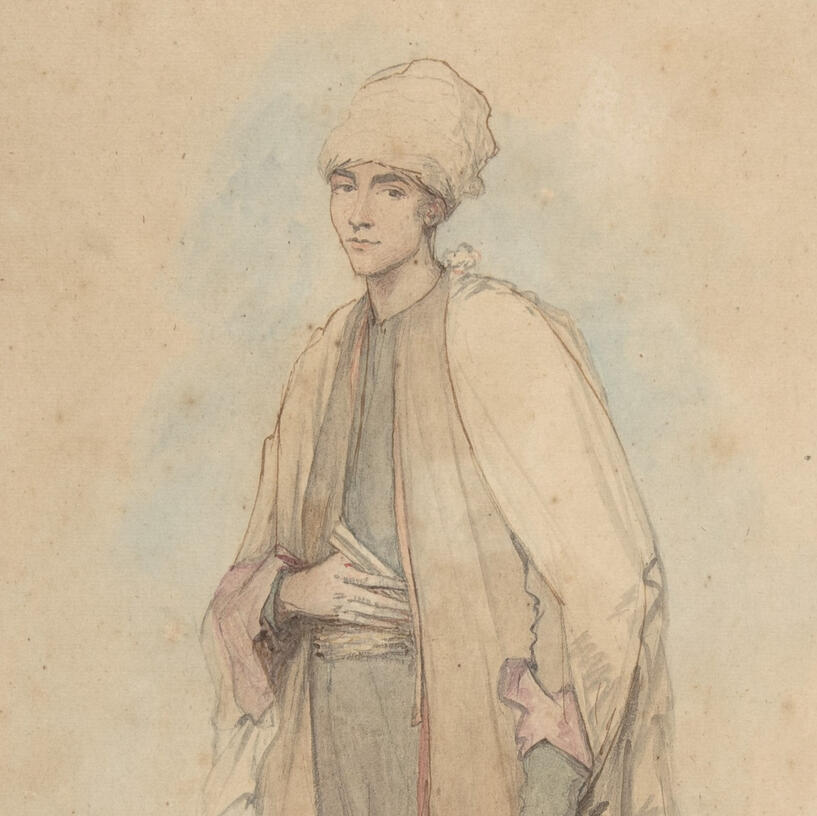
Call for Contributions: Encounters between Masculinities in the Pre-Modern WorldFollowing the workshop Intercultural Encounters between Masculinities in the Pre-modern World: Emotions and Religion at the Gender and Women’s History Research Centre, Australian Catholic University, we are looking for additional contributions for an edited volume to submit for publication to Amsterdam University Press.This volume will focus on the study of intercultural encounters between masculinities in the pre-modern world, privileging the lenses of emotions and religion. It aims to foster a discussion on how masculinities could affect the processes of cultural encounter and their outcomes, and how masculinities themselves, in turn, emerged changed from such processes.Past scholarship has demonstrated that masculinity, understood as a system of practices and far from being a monolith, is subjected to both historical change and culturally dependent expressions. The study of masculinities has successfully investigated previously unexplored aspects of specific cultures and contexts and their changes over time. This volume aims to build on previous research to engage with encounters between different masculinities.Contributions on any region of the pre-modern world, from all disciplines and fields of Humanities and Social Sciences are welcome.Please send a short abstract (100/150 words) and bio to linda.zampoldortia[@]unive.it by 15 April 2025.

This workshop aims to analyse the religious and cultural encounters between Asia and Europe (before 1945) through the lenses of emotions, affects, and feelings. In the past decades, the affective/emotional turn has sustained the re-assessment, and increased our understanding, of many historical processes and contexts. From this point of view, scholarship has just started investigating the history of the encounters between Asia and Europe and this workshop intends therefore to promote scholarly discussion on this theme.Programme and Book of Abstracts
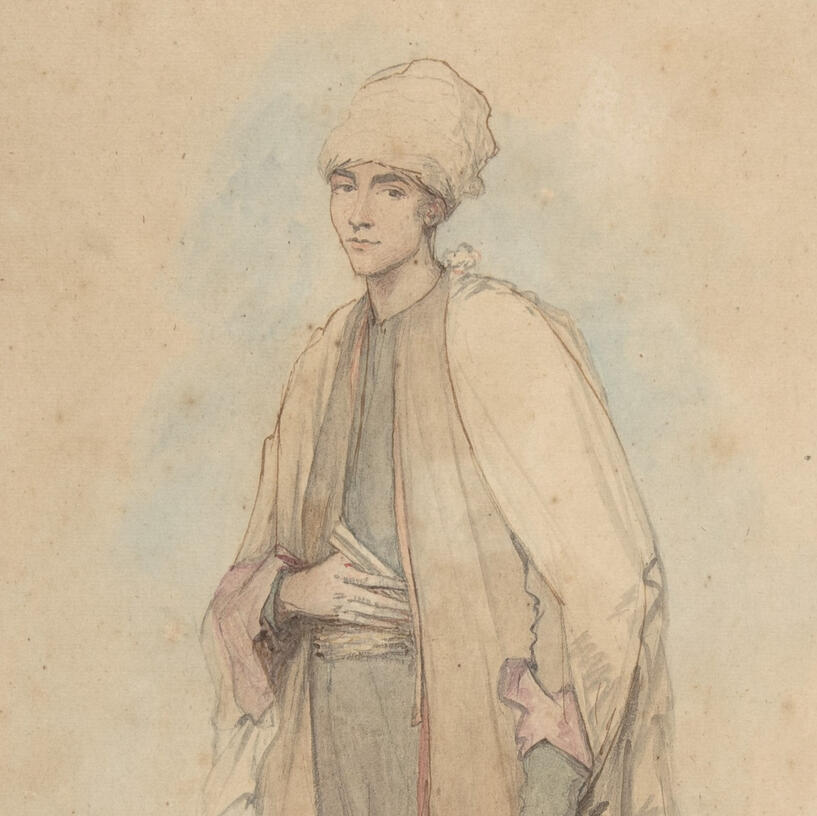
Hybrid Workshop Intercultural Encounters between Masculinities in the Pre-modern World: Emotions and Religion
15-16 July, Melbourne & online, hosted by the Gender and Women’s History Research Centre, Melbourne and Online, 15-16 July 2024.
convened by Dr Linda Zampol D’Ortia and Prof. Susan Broomhall.This workshop aims to further the study of intercultural encounters in the pre-modern world through the lens of gender. More specifically, we mean to foster a discussion on how masculinities could affect the processes of cultural encounter and their outcomes, but also how masculinities emerged and changed in turn from such processes.Past scholarship on masculinity has demonstrated that masculinity, understood as a system of practices and far from being a monolith, is subjected to both historical change and culturally dependent expressions. The study of masculinities has successfully investigated previously unexplored aspects of specific cultures and contexts and how they changed over time. In this workshop, we aim to build on previous research on masculinities during intercultural contacts and in colonial contexts, to engage with encounters between different masculinities. We look forward to receiving contributions on any region of the pre-modern world, from all disciplines and fields of Humanities and Social Sciences. We particularly welcome papers on the religious and/or the emotional and affective dimensions of encounter.Programme
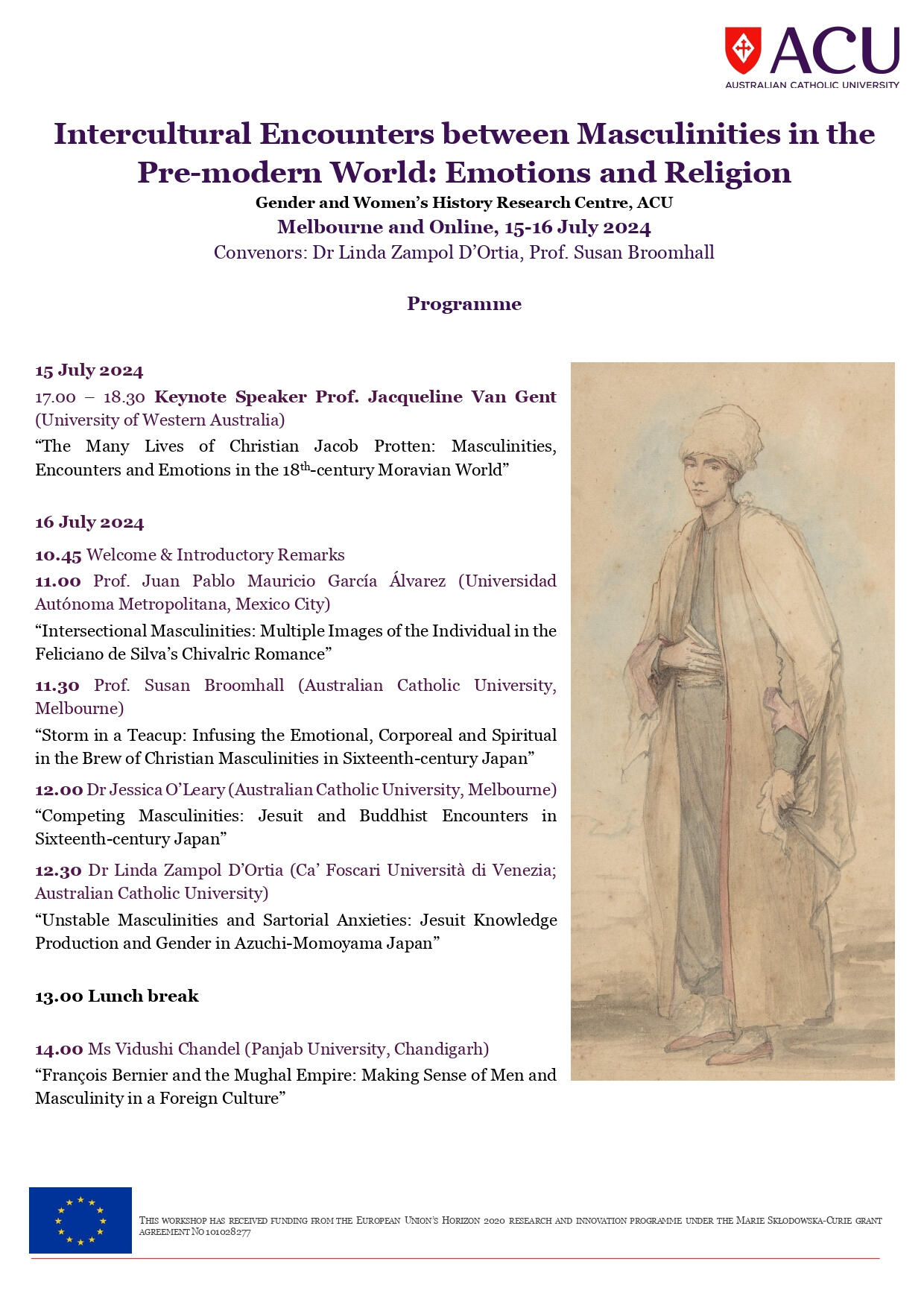
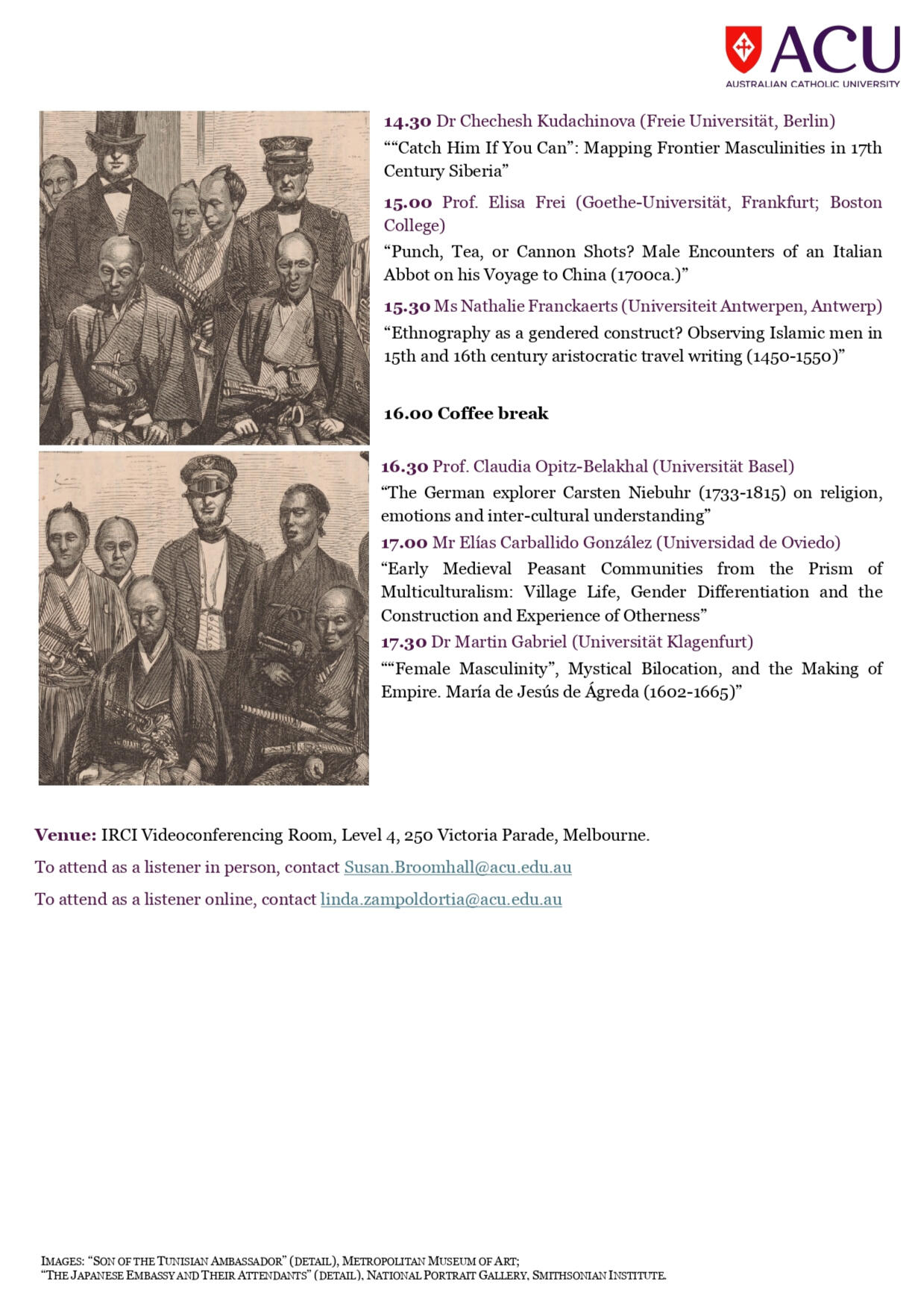
Past Activities
Workshop Gender and Emotion in Asia-Pacific Catholicisms
28 February - 1 March 2024, online
Initiative for the Study of Asian Catholics (ISAC), Asia Research Institute (Singapore)This conference aims to question how the religious lives of Catholic people in the Asia-Pacific region are informed by socially and temporally specific understandings of emotions and affects, and normative ideas about gender. It thus seeks to further our understanding of perceptions, experiences, practices, beliefs of Asia-Pacific Catholic women, men, and non-binary people by using lenses of both gender and emotion.info, program, videos
Past Activities
International workshop "Gender and Emotion in Japanese Christianity (1549-1638)"
7 February 2023, Melbourne & online
Australian Catholic University
info
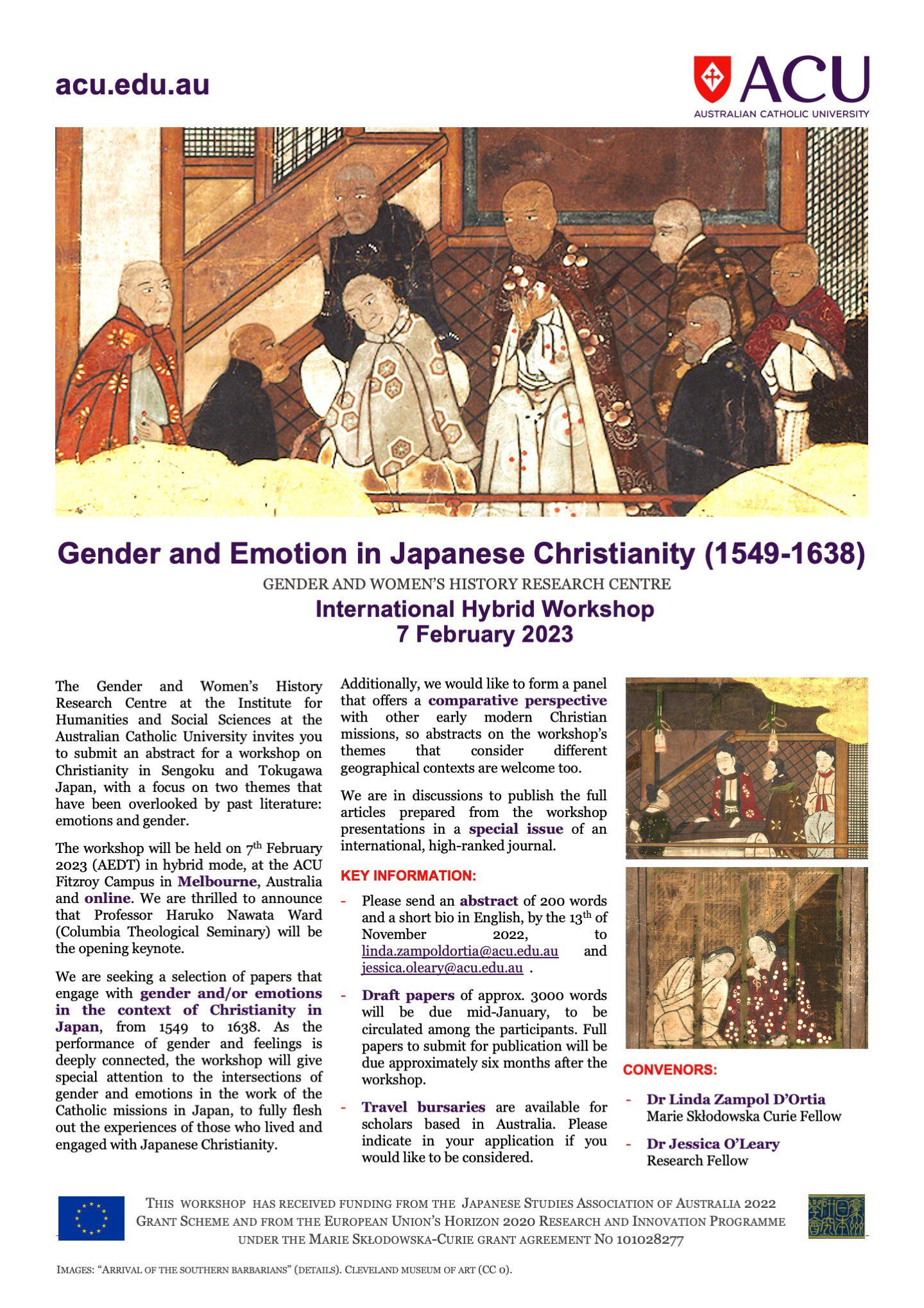
Contacts
Send an email to: linda.zampoldortia [at] unive.it